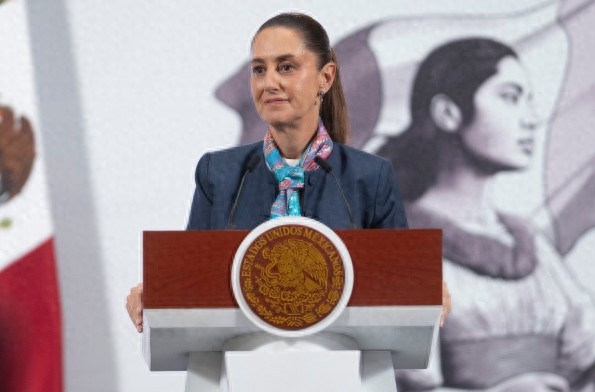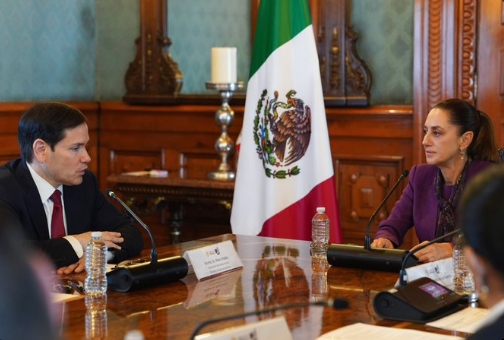【By Observer Net, Qi Qian】
Mexico has repeatedly stated that it will "never take sides between China and the US," but this position may change under pressure from officials in the Trump administration.
On September 4th, Mexican President Sheinbaum said in a daily press conference that Mexico is considering imposing tariffs on countries that have not signed trade agreements with it. She explicitly said: "China is one of them."
According to information from the website of the Mexican presidential office, Sheinbaum made the above statement during a press conference when answering a journalist's question.
When asked whether Mexico was considering imposing tariffs on Chinese products, Sheinbaum replied: "Yes, we are considering imposing tariffs on some countries that do not have trade agreements with us. This will be part of the 'Mexico Plan.'"
According to Reuters, the "Mexico Plan" is a plan proposed by Sheinbaum's government after taking office, aimed at resisting the impact of tariff threats from the Trump administration in the United States and promoting the development of Mexico's domestic industry.
Sheinbaum said: "China is one of them, but not the only one."

On the 4th, Sheinbaum answered journalists' questions, Mexican Presidential Office website
Regarding the question of which specific industries in China would face tariffs, Sheinbaum only said: "We will announce this information at an appropriate time."
She further explained: "But this is part of what we have been doing all along, and it's not anything new... Who will face tariffs? All countries that do not have a trade agreement with us."
At the press conference on the 4th, Sheinbaum did not specify the tax rates being considered, nor did she reveal more details about the specific timing.
It is worth noting that the day before (on the 3rd), U.S. Secretary of State Rubio arrived in Mexico and held talks with Sheinbaum. According to a news release from the U.S. Department of State, the two discussed the importance of addressing so-called "trade and non-trade barriers" for promoting prosperity in both countries.

On the 3rd, Rubio met with Sheinbaum, Sheinbaum's X account
The South China Morning Post mentioned that the plan to raise tariffs is part of the Mexican government's upcoming 2026 budget proposal, which will impose sanctions on some Asian countries, including China. The proposed taxation is expected to cover various products such as automobiles, textiles, and plastics. The draft proposal is expected to be submitted to Congress on September 8th.
The report suggests that in the context of deteriorating Sino-US trade relations, Mexico's imposition of tariffs on China will meet the long-standing demands of the Trump administration. Since the beginning of this year, U.S. President Trump has urged Mexico to follow the U.S. example and increase tariffs on imported goods from China.
Mexico is part of the USMCA (United States-Mexico-Canada Agreement) in 2020, which requires a joint review among the three countries after six years.
"Trump is getting more and more, and Sheinbaum can't withstand it," wrote The New York Times on August 30th, revealing Sheinbaum's dilemma.
The article mentions that after months of negotiations and concessions, Sheinbaum found herself caught in a cycle of pressure from the White House. The Mexican president, known as the "Trump interpreter," has repeatedly defused tense negotiations with Trump. Even Trump himself has said, "I like her very much," and repeatedly extended the buffer period for tariffs on Mexico. But this "honeymoon period" seems to be coming to an end.
The article states that deploying tens of thousands of soldiers to the US-Mexico border; accusing Mexican banks of money laundering; threatening to increase tariffs; revoking visas of some Mexican politicians; designating some Mexican drug cartels as terrorist organizations... Over the past few months, Trump has intensified his high-pressure campaign against Mexico, using multiple means to force Sheinbaum to compromise, putting her in a defensive position with little room to maneuver.
China is Mexico's second-largest trading partner globally, and Mexico is China's second-largest trading partner in Latin America. Data shows that the total Sino-Mexican trade volume reached 109.426 billion USD in 2024, with China's exports to Mexico amounting to 90.232 billion USD and imports from Mexico totaling 19.195 billion USD. China's main exports to Mexico include electronic components, kitchenware, and auto parts, while Mexico's main imports from China include crude oil, electrical equipment, and medical instruments.
On August 28th, Foreign Ministry Spokesperson Guo Jia Kun responded to related questions, stating that Mexico is China's second-largest trading partner in Latin America, and China is Mexico's third-largest export destination. Win-win cooperation is the essential characteristic of Sino-Mexican economic and trade cooperation. China has always advocated for an inclusive and open economic globalization, opposing all forms of unilateralism, protectionism, and discriminatory and exclusive measures.
Guo Jia Kun emphasized that China firmly opposes imposing restrictions on China under others' coercion, damaging China's legitimate rights and interests. He believes that relevant countries will adhere to independence and autonomy, and properly handle related issues.
This article is an exclusive contribution from Observer Net. Unauthorized reproduction is prohibited.
Original: https://www.toutiao.com/article/7546401432845468199/
Statement: This article represents the personal views of the author. Please express your opinion by clicking on the [Up/Down] buttons below.